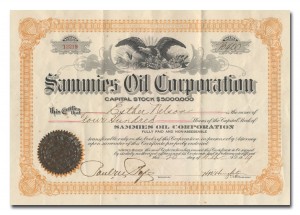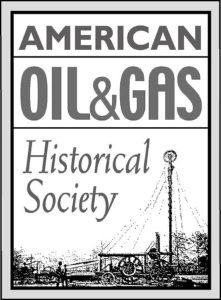
The Texas oil patch was making headlines as World War I raged in Europe. An earlier major discovery at Electra had launched a drilling boom that brought new exploration and production companies to nearby Wichita Falls.
As early as 1911, newly discovered Mid-Continent oilfields like Electra produced almost half of all the oil in Texas.
Refineries began to appear in Wichita Falls in 1915 when Wichita County alone reported 1,025 producing wells. Learn more about the Electra boom in Pump Jack Capital of Texas.
In 1917, one Eastland County well – the “Roaring Ranger” – revealed a giant oilfield that would help fuel the U.S. Army when it entered the war the next year. A third major discovery will soon arrive at Burkburnett as still more drilling companies flow into the region.
Incorporated in August 17, 1917, Sammies Oil Corporation was among the new companies to join the highly competitive race for finding, transporting and refining North Texas “black gold.”
A July 1918 discovery well in Burkburnett came in at 3,000 barrels per day – triggering another another boom that brought more companies to North Texas (learn more in “Boom Town” Burkburnett).
In October 1919, the company changed its name to Choate Oil Corporation. At that time, it was capitalized at $5 million with 500,000 shares (no par value) and no dividends paid. “Choate,” when used in American law, means “completed or perfected in and of itself.”
Choate Oil owned a 2,000 barrel a day refinery in Oklahoma City and had interests in a Burkburnett oil pipeline, storage facilities, and more than 150 oil tank cars.
Despite these assets and a producing lease in Louisiana’s Caddo oilfield, by November 1922, Choate Oil was bankrupt and the company’s entire holdings were sold at auction in Oklahoma City with bids continued to January 17, 1923.At its peak, Choate Oil also owned a natural gas company in Ranger, Texas, as well as the Sammies Oil & Supply Company, which distributed petroleum products in Iowa and South Dakota.
One little-known result of the North Texas oil boom and the Ranger oilfield is that after World War I, a young Conrad Hilton visited the region intending to buy a bank. Instead, after seeing long lines of roughnecks waiting for a motel room, he bought his first motel. Read more in Oil Boom Brings First Hilton Hotel.
___________________________________________________________________________________
The stories of exploration and production companies joining petroleum booms (and avoiding busts) can be found updated in Is my Old Oil Stock worth Anything? The American Oil & Gas Historical Society preserves U.S. petroleum history. Please support this AOGHS.ORG energy education website. For membership information, contact bawells@aoghs.org. © 2019 Bruce A. Wells.
___________________________________________________________________________________

